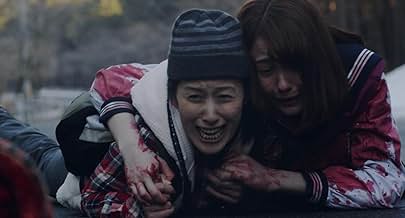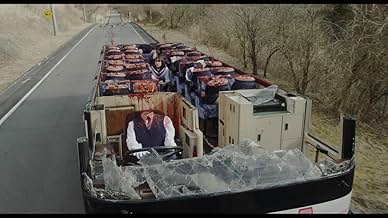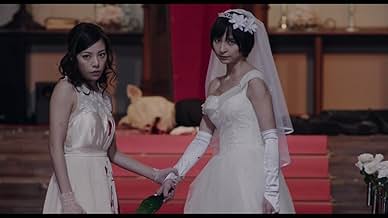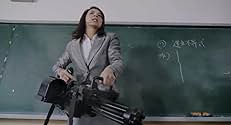NOTE IMDb
6,1/10
8,7 k
MA NOTE
Une femme est bannie d'un ensemble bizarre de réalités alternatives.Une femme est bannie d'un ensemble bizarre de réalités alternatives.Une femme est bannie d'un ensemble bizarre de réalités alternatives.
- Réalisation
- Scénario
- Casting principal
- Récompenses
- 2 victoires au total
Avis à la une
If nothing else, Sion Sono possesses an admirable work ethic. Depending on how one counts such things (and despite the often sprawling length of his films), he's averaged at least one major theatrical release per year since catching the attention of international cinephiles and horror nerds with 2001's Suicide Club. That's on top of an ambitious schedule of television shows, short films and little-seen mystery projects. Even so, 2015 was a banner year. Over a twelve-month period, the director cranked out five full-length features in a bewildering variety of genres and styles, finally rivaling the mad profligacy of Takashi Miike, Sono's countryman and peer in overcranked eccentricity.
Tag, the first of these films semi-available to Western viewers, is an ambitious if modestly budgeted exercise in surrealist dream-horror. Sono's film takes inspiration and its Japanese title, "Riaru Onigokko" ("Real Tag"), from a popular science fiction thriller by teen-lit superstar Yusuke Yamada. Given that the novel in question recently spawned not only a successful screen adaptation but an entire, ongoing film franchise, it might seem strange that a celebrated art-house iconoclast would so soon choose to pay it another visit. In scripting his own version, however, Sono deviates significantly from Yamada's text, twisting the straightforward tale of a young man hunted by mysterious forces into a fragmentary, gore-soaked and frequently comical deconstruction of female identity in contemporary media and society.
The story concerns a teenager named Mitsuko (Reina Triendl) and her attempts to navigate the inconstant landscape of what I hesitate to call her reality. We're given little opportunity to know Mitsuko, as Tag provides us no access to her past or inner life. Instead she's a blank and rather sleepy slate, and we drop into her ordinary schoolgirl's day in stereotypical media res. When the relative calm of a brief opening idyll explodes in grisly mayhem, we understand no more than Mitsuko herself, and from there we tumble with her, bouncing repeatedly from confusion to carnage and back again. Nothing we encounter coheres for more than a moment or two, not even Mitsuko's paper-thin sense of self.
As our hapless heroine's trip down the razor-lined rabbit hole progresses, even her name and face become subject to revision. Though Triendl's Mitsuko remains central, three actresses eventually step in and out of the lead role. Mariko Shinoda plays the character as bride- to-be "Keiko", while Erina Mano appears as a determined young athlete named "Izumi", each quite strong and distinct in her portrayal. It's worth noting here that much of Tag's runtime is populated exclusively by women. This lends a distinctly political edge to the film's constant threat of apocalyptic violence, especially when combined with the polymorphous protagonist's adaptive blankness. For those who might need a bit more prompting, a hilariously bizarre third-act reversal makes Sono's intentions crystal clear.
I don't know about you, but I'm a sucker for bugged-out existential thrillers in which the fundamental nature of reality is called into question, so I found Tag's shifting, looping, self-sabotaging storyline quite intriguing. Better yet, Sono corrals his penchant for long-winded digression this time out, confining himself to a careening, 85-minute sprint. This allows the film's disruptions and mysteries to retain their charge from beginning to end, despite the fact that "making sense" isn't high on the agenda. Many will doubtless feel cheated by the elliptical resolution, but as far as I'm concerned, the thrill of the ride more than justifies the price of admission.
Tag, the first of these films semi-available to Western viewers, is an ambitious if modestly budgeted exercise in surrealist dream-horror. Sono's film takes inspiration and its Japanese title, "Riaru Onigokko" ("Real Tag"), from a popular science fiction thriller by teen-lit superstar Yusuke Yamada. Given that the novel in question recently spawned not only a successful screen adaptation but an entire, ongoing film franchise, it might seem strange that a celebrated art-house iconoclast would so soon choose to pay it another visit. In scripting his own version, however, Sono deviates significantly from Yamada's text, twisting the straightforward tale of a young man hunted by mysterious forces into a fragmentary, gore-soaked and frequently comical deconstruction of female identity in contemporary media and society.
The story concerns a teenager named Mitsuko (Reina Triendl) and her attempts to navigate the inconstant landscape of what I hesitate to call her reality. We're given little opportunity to know Mitsuko, as Tag provides us no access to her past or inner life. Instead she's a blank and rather sleepy slate, and we drop into her ordinary schoolgirl's day in stereotypical media res. When the relative calm of a brief opening idyll explodes in grisly mayhem, we understand no more than Mitsuko herself, and from there we tumble with her, bouncing repeatedly from confusion to carnage and back again. Nothing we encounter coheres for more than a moment or two, not even Mitsuko's paper-thin sense of self.
As our hapless heroine's trip down the razor-lined rabbit hole progresses, even her name and face become subject to revision. Though Triendl's Mitsuko remains central, three actresses eventually step in and out of the lead role. Mariko Shinoda plays the character as bride- to-be "Keiko", while Erina Mano appears as a determined young athlete named "Izumi", each quite strong and distinct in her portrayal. It's worth noting here that much of Tag's runtime is populated exclusively by women. This lends a distinctly political edge to the film's constant threat of apocalyptic violence, especially when combined with the polymorphous protagonist's adaptive blankness. For those who might need a bit more prompting, a hilariously bizarre third-act reversal makes Sono's intentions crystal clear.
I don't know about you, but I'm a sucker for bugged-out existential thrillers in which the fundamental nature of reality is called into question, so I found Tag's shifting, looping, self-sabotaging storyline quite intriguing. Better yet, Sono corrals his penchant for long-winded digression this time out, confining himself to a careening, 85-minute sprint. This allows the film's disruptions and mysteries to retain their charge from beginning to end, despite the fact that "making sense" isn't high on the agenda. Many will doubtless feel cheated by the elliptical resolution, but as far as I'm concerned, the thrill of the ride more than justifies the price of admission.
With an opening sequence that tops 'Suicide Club" in shock value, aesthetics and eeriness, "Tag" targets a gore-hungry audience, but goes deeper with the many philosophical and psychological themes of determinism, power, fear, reality and identity.
"Tag" tackles greater issues than most films and does so well with a brisk pace that takes the viewer along the joyride (or hellride depending on how you see it) and makes him/her identify with the lead character's distress. The three leads who play the same persona are very well cast and effective in edging us into our seats. Their acting is grounded while the rest of the movie is often over the top at parts.
The daring premise, edgy editing, themes and tones are strong, yet Sono falls slightly short of his best work by making a clearly uneven piece at times with some easy thrills and instances with little coherence or content sneaking in. He proves showy, self-indulgent, eager to please the crowd and even uses questionable short-cuts instead of going deeper into the surreal, suspenseful and sublime narrative.
We are left with many questions like many of Sono's films, but in this case, we also understand that perhaps he could have asked himself more questions in the making in order to overcome some unwanted extraneous confusion and loss of focus. This is especially troublesome as it clocks less than 90 mins (uncharacteristic for long-winded Sono - see 237 mins "Love Exposure" as extreme example) and still shows some filler farce instead of sure hit fire-power.
Some superficial moments over subtlety and substance holds this film back, but the brute force and fantastic screen-writing and directing defy denying this fresh film its place into the pantheon of path-breaking provocative piece of cinema.
Despite its minor and more blatant flaws, this film holds well to a metaphorical mirror and is not in search of identity like its main character. It is disconnected beyond its useful purpose, but parades around arguably able to arouse sympathy and separately speak volume on our psychological individual and societal brink of breakdown.
Try to be spontaneous. Accept the surreal and tolerate the slapstick and silliness.
Japan 2015 | 85 mins | FANTASIA INTERNATIONAL FILM FESTIVAL | DCP | Japanese (English subtitles)
"Tag" tackles greater issues than most films and does so well with a brisk pace that takes the viewer along the joyride (or hellride depending on how you see it) and makes him/her identify with the lead character's distress. The three leads who play the same persona are very well cast and effective in edging us into our seats. Their acting is grounded while the rest of the movie is often over the top at parts.
The daring premise, edgy editing, themes and tones are strong, yet Sono falls slightly short of his best work by making a clearly uneven piece at times with some easy thrills and instances with little coherence or content sneaking in. He proves showy, self-indulgent, eager to please the crowd and even uses questionable short-cuts instead of going deeper into the surreal, suspenseful and sublime narrative.
We are left with many questions like many of Sono's films, but in this case, we also understand that perhaps he could have asked himself more questions in the making in order to overcome some unwanted extraneous confusion and loss of focus. This is especially troublesome as it clocks less than 90 mins (uncharacteristic for long-winded Sono - see 237 mins "Love Exposure" as extreme example) and still shows some filler farce instead of sure hit fire-power.
Some superficial moments over subtlety and substance holds this film back, but the brute force and fantastic screen-writing and directing defy denying this fresh film its place into the pantheon of path-breaking provocative piece of cinema.
Despite its minor and more blatant flaws, this film holds well to a metaphorical mirror and is not in search of identity like its main character. It is disconnected beyond its useful purpose, but parades around arguably able to arouse sympathy and separately speak volume on our psychological individual and societal brink of breakdown.
Try to be spontaneous. Accept the surreal and tolerate the slapstick and silliness.
Japan 2015 | 85 mins | FANTASIA INTERNATIONAL FILM FESTIVAL | DCP | Japanese (English subtitles)
I discovered this film from a Humour site who posted a sample video of this film. It made me curious to watch this film because of the cute chick plus the gory scene in the trailer.
The story is kind of deep. I think, It's trying to make its audience a mind blown effect. But it isn't. I'm unsatisfied with the dialogue trying to give a meaningful line. I think the novel version tells a lot than the movie version.
Regarding the special effects, instead of scrutinizing the not so bad and not so good gory scenes, just okay, I just laugh it out. I don't know if there's something wrong with me, but I really find those scenes funny.
After watching this film, It made me more curious and I want to read the original story of the novel this film was based.
Thank you.
The story is kind of deep. I think, It's trying to make its audience a mind blown effect. But it isn't. I'm unsatisfied with the dialogue trying to give a meaningful line. I think the novel version tells a lot than the movie version.
Regarding the special effects, instead of scrutinizing the not so bad and not so good gory scenes, just okay, I just laugh it out. I don't know if there's something wrong with me, but I really find those scenes funny.
After watching this film, It made me more curious and I want to read the original story of the novel this film was based.
Thank you.
I never would have seen this movie or known of it's existence without my kids. My daughter showed me a clip from the first 10 minutes, and I was hooked, because I had to know what was going on. From then on, it was silly and juvenile but every now and then very unexpected things would happen. I'm not sure if this is deemed a horror or sci-fi, but the Japanese film industry sure is different, and occasional worth diving into. I'm glad I watched it, but wouldn't necessarily recommend it.
This movie is hard to explain and also hard to watch. You could make a strong case for it being very incoherent, but you could also argue the opposite. And it's not that one or the other would be right overall. What you can say about this, is that it completely messes with your head (avoiding other words here,to keep it family friendly).
But the completely over the top and also very violent content will either appeal or appall you as a viewer. The very weird story, that I couldn't really explain even if I tried to, has the same thing going for or against it, depending on your point of view. If you want and can wrap your head around things happening (you can't just watch it and do other stuff, the movie needs your overall, full and undivided attention), then you will be entertained - if you are into that sort of strange storytelling that is
But the completely over the top and also very violent content will either appeal or appall you as a viewer. The very weird story, that I couldn't really explain even if I tried to, has the same thing going for or against it, depending on your point of view. If you want and can wrap your head around things happening (you can't just watch it and do other stuff, the movie needs your overall, full and undivided attention), then you will be entertained - if you are into that sort of strange storytelling that is
Le saviez-vous
- AnecdotesThe music used in the background is the same music in The Walking Dead opening score.
- GaffesIn the beginning, when the buses and girls are sliced in half, many of the bodies spurt blood into the air, like geysers. But this wouldn't happen, because without the top halves of their bodies, they would be missing the organ responsible for the movement of all blood in a body--their hearts.
- ConnexionsRemake of Riaru onigokko (2008)
Meilleurs choix
Connectez-vous pour évaluer et suivre la liste de favoris afin de recevoir des recommandations personnalisées
- How long is Tag?Alimenté par Alexa
Détails
Box-office
- Montant brut mondial
- 995 024 $US
- Durée1 heure 25 minutes
- Couleur
- Rapport de forme
- 1.85 : 1
Contribuer à cette page
Suggérer une modification ou ajouter du contenu manquant























